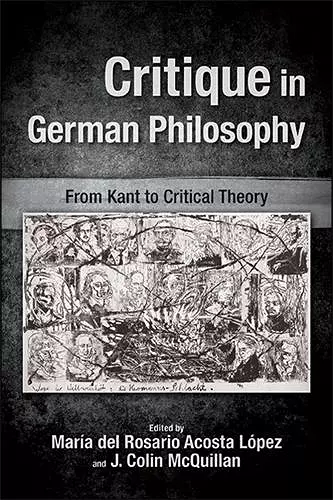Critique in German Philosophy
From Kant to Critical Theory
J Colin McQuillan editor María del Rosario Acosta López editor
Format:Paperback
Publisher:State University of New York Press
Published:2nd Jul '21
Should be back in stock very soon
This paperback is available in another edition too:
- Hardback£72.50(9781438480275)

Traces a conceptual history of critique in German philosophy from the eighteenth century to the present.
Critique has been a central theme in the German philosophical tradition since the eighteenth century. The main goal of this book is to provide a history of this concept from its Kantian inception to contemporary critical theory. Focusing on both canonical and previously overlooked texts and thinkers, the contributors bring to light alternative conceptions of critique within nineteenth- and twentieth-century German philosophy, which have profound implications for contemporary philosophy. By offering a critical revision of the history of modern European philosophy, this book raises new questions about what it means for philosophy to be "critical" today.
"The contributors assembled in this very thorough and fascinating collection ably capture not only the complexity of aims and influences at work in Kant's seminal formulation of critique, but just how contested and dynamic that formulation proved to be in the hands of his successors. It makes the case that the notion of critique—its point, object, method, and relationship to the field of philosophy—has been perhaps the perennial concern of the German philosophical tradition since Kant, and the thread that unifies most of the major figures in this tradition." — Todd Hedrick, author of Reconciliation and Reification: Freedom's Semblance and Actuality from Hegel to Contemporary Critical Theory
"In this splendidly comprehensive, challenging, and sometimes urgent collection, the great tradition of modern German philosophy is reconstructed from the perspective of critique, where critique is taken to be philosophy's self-consciousness as simultaneously bound by the demands of reason and the claims of human need.
"While Kant's philosophy incongruously but emphatically joined the critique of metaphysics with Enlightenment rationalism, beginning with Schiller, critique becomes the recurrent procedure and signature of a philosophical tradition committed to undoing the cruel rationalities that underlie and succor modern forms of domination; critique is the self-critique of reason as domination. Critique, steering a difficult course between dogmatic rationalism and skepticism, is the practice of philosophy as always self-critique for the sake of the emancipation of self and other. Critique means to expose hidden bias, challenge illusory authority, unsettle accepted meanings, destroy shibboleths, and defy power masked as reason. In critique, philosophy again and again seeks to forge the ties connecting reason to destitute humanity. This volume belongs on the bookshelf of every student of German philosophy." — J. M. Bernstein, New School for Social Research
ISBN: 9781438480268
Dimensions: unknown
Weight: 594g
446 pages